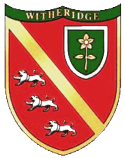

|
Mrs Gard was born in 1893 and lived for some years at Chumleigh Week. In 1917 her husband, before leaving for the Services, decided that the place was too isolated from people and the shops and so they rented the middle of one of a row of cottages (owned by Mr Smyth of Town Farm) just south of Drayford Bridge. The Cottages of cob and stone with tin roofs were demolished in the 1960's. The cottage at the road end of the row still had, at that time, the Clockmakers board on the house, with the name "Bradford" on it. William Bradford had been making clocks in Drayford since at least the 1760s, but had moved to Tiverton by 1808 and continued with his clock making business. Just above the row of cottages was a "penthouse," a blacksmiths shop (not recorded in the Directories of the period). It was a tradition that the innermost cottage had been a pub called "The Rising Sun." (No reference can be found in the Directories.) The road to South Molton, known as Rock Road because of the quarry, and Mrs Gard is certain that "old Mr Venner" always said the turnpike gate and tollhouse was situated on the site of Thornham Chapel. (Mrs Gard's husband was a County Council roadman who also swept chimneys.) Water was often a problem; the well at Hillside often used to dry up in summer and people used to go up Rock Road to Rock Well for clean spring water. "Three acres and a cow" was promised after the 1914-18 War; Stuckey's and Godswells were two of these. There used to be "allotments up Rock Road." The roads were so bad after the 1914-18 War that pit props were cut to put in the ruts. Further up the road to South Molton was a pub at Duckspuddle on Meshaw Moor where, it was said: "The ducks used to paddle in the beer." Just north of Drayford Bridge by the ground known as Drayford Green, Mr Harry Lewis planted four chestnut trees "in memory of the war 1914 -18, one tree for each year of the war." All grew well at first, but three unexpectedly died and it was suggested that someone had poisoned them. "Wild rhubarb." used to cover Drayford Green. (New chestnut trees, given by Mr F. Woollacott of West Yeo, were planted on Drayford Green by the Parish Council in 1978) The footpaths in "Stockham Wood" were popular, and "Mr Lake used to ride the lower path once a year to keep them open." Drayford Mill was still working in the 20's - 30's and the eleven Gard children used to enjoy playing hide and seek in and around the Mill, unknown to their parents. Other games included tag, hoops, marbles, skipping, kicking tins, and King Smuggler. The children made sure that the pears on the big pear tree, opposite Venner's, never had time to get ripe. Molly recalls that they used to use the footpath below Town to get to Worlington School except "when Mr Smyth's black pony was out in the field." On one occasion, Mr Harry Smyth caught some of them going to school with their pockets full of apples and made them empty out their pockets. They used to pull moss out of the hedgebanks and play with it; Mr Smyth warned them and then "came one day on his pony and caught them and said George (George Gard) was ringleader and George took heels and went in across the river" which was up to his waist. Mrs Gard was waiting for him to come from school and she heard him come in "splish splosh." She recalls that children were lively but never nasty and destructive. One of the favourite games was to "swing up and down on a beech tree limb" and one day a farmer came and the children who were holding the limb down, let go and it swung up and nearly took Molly with it, up out of sight, and the farmer never saw her. They came back later and helped her down. Mrs Gard recalls that outings were a great excitement; on one occasion, Molly and her sister were so determined not to be late for the very early start for a Sunday school outing that they were dressed up in their best the night before and slept in their clothes. The children did not use hot water to wash in; they used to take soap and towel and wash in the river. Mrs Gard recalls one occasion when George was about eight, he and his brother hung their clothes on "a lot of old withy bushes by Mrs Butt's" and went peddling about naked in the river, which was running dirty and slimy at the time. Mrs Venner came and complained to Mrs Gard who "went down with a little slip stick" and drove them home naked, carrying their clothes. The children used to play with an old man trap from the old blacksmith's shop and one day one of the brothers stilled the trap in the wood and caught his brother, the spring had gone and there was no danger of an injury. The children went to collect acorns by the bucketful when the family had a pig; this pig had to be taken to "the orchard" in the morning and Charles (one of the brothers) used to ride the pig back home from the orchard in the evening. Sometimes, the children used to go stone picking for Smyth's. At the time of the Lynmouth floods, "the bottom of Drayford Bridge was washed out", Molly (they lived at Way's Cottage) had "to catch up the children by the river", and in the house she was up to her waist in water and had to be carried upstairs. Remarks made about Witheridge included "the last place anyone would want to go would be Witheridge" and "I don't like going up there with all they old sheeps heads hanging out the windows, like butcher's shops." When the ropeway was deliberately stopped one dinner time, the passenger was Archie Nott himself. No buses called at Drayford in the 1920s; all had to come up to Witheridge to get the van or the bus. Mr Jack Chudley farmed at Stuckey; he used to "go funny" and go on strike against himself. He was a fine farmer but "the least thing set him off", once one of his pair of horses went lame, but as the other one kicked, no one would lend him one and "he went off." Thelbridge was always called "Delbridge" and Morchard was always called "Morchet" Over to Mareleigh amongst the treesBarley, bread and vinnied cheese Sour milk and bony pie If you don't believe me Go over and try Mrs Gard recalls that Mr Gard would not take salmon but "the boys were keen." One night someone tapped at the window and when opened, a salmon came through. To get a salmon a rabbit wire on a stick was used or a gaff. Mr Lewis caught eels by the bucketful when the water was dirty and high. All recalled what good eating they were. China ornaments were called "Joanies" and the use of the name continues Mrs Gard recalls skinning "hundreds of moles" and pegging the skins out on the floor. Mr Gard used to "till the traps" and the children had to inspect them on the way to school. Previous Last Edited 03/07/2006 Copyright © 2000-2006 Witheridge Unless otherwise indicated on the page in question, the photographic images reproduced on this site belong to the Witheridge Archives, and, as such may not be reproduced for commercial purposes without written permission. However, you are welcome to use any of the photographs belonging to the archive for personal and/or non-commercial use. Any material shown as not being owned by the archive may not be reproduced in any form without first receiving written permission from the owner of the material in question. |

